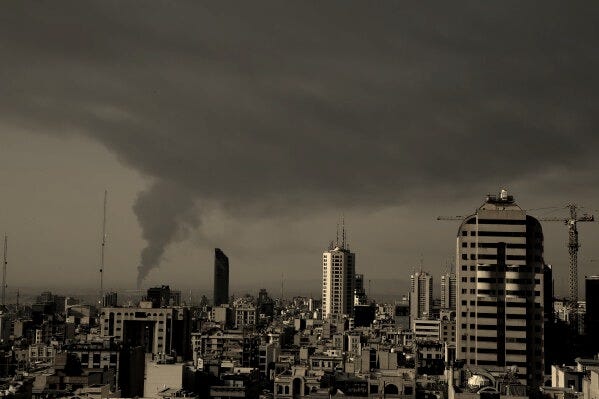Ellie Called Her Mother in Iran. A Robot Picked Up.
Someone is intercepting international calls into Iran. The question is.. who?
Ellie just wanted to hear her mother’s voice.
Her mother was alone in Tehran, where Israeli airstrikes had just knocked out fuel depots and communication towers. In the chaos that followed, Israel pushed out mass warning messages to Iranian citizens. Iranian hackers hit back by hijacking state TV, urging people to rise up. Some did.
That’s when Iran pulled the plug. The government shut down the internet, jammed mobile networks, and cut off international calls. The country went dark.
So Ellie tried calling her mother. The line wouldn’t connect. Then suddenly, someone picked up.
But it wasn’t her mother.
"Alo? Alo? Who is calling?" said a strange, robotic voice. It was female. The accent was British, but something was off. The voice didn’t sound human. The phrasing was wrong. The sentences were clumsy. It introduced itself as Alyssia. Then it went silent.
Her mother never got the call.
Ellie isn't the only one. Iranians living in the UK and US are reporting similar stories. They try to call loved ones back home in Iran, but instead of hearing a familiar voice, they get something deeply unsettling. A robotic woman speaking broken English. Messages that sound like self-help videos. Some are told to imagine walking through a forest or sitting peacefully on a beach. Others hear vague affirmations about life and gratitude. If they try to respond, the voice keeps talking like it can’t hear them.
Some calls don’t go through at all. They just ring and ring. Others drop mid-connection. In rare cases, families find workarounds.
Ellie, managed to speak to her mother through a contact near the Iran-Turkey border who had two phones, one with an Iranian SIM card and one with a Turkish SIM. The contact called her mother using the Iranian phone and held it up to the Turkish phone, where Ellie was on the line, allowing them to talk despite the blackout.
This is intentional.
They are intentionally blocking all international calls, along with a nationwide internet blackout for Iranian citizens.
Experts who reviewed recordings believe the calls are being intercepted and rerouted. The voices sound like pre-recorded messages or very basic AI chat-bots. This isn’t consumer tech. It is a crude form of psychological warfare.
It is meant to confuse. It is meant to isolate. It is meant to make people feel watched and it appears to be triggered by where the call is coming from.
Why the British Accent Matters
When Ellie called from the UK, the robotic voice she heard had a British accent. That wasn’t random. It felt close. Too close. It sounded like it was meant just for her.
Calls into Iran are automatically tagged with international dialing codes. If you're calling from the UK, that metadata is stamped on your call. It tells the system exactly where you're calling from. So if the voice changes based on the origin of the call, that means someone is customizing responses to match the caller's background.
1. Targeted Psychological Warfare
If the voice matches your accent or location, the message hits harder. It feels more personal. And when the message is wrong or eerie, it leaves you shaken. It makes you wonder: who is watching me? Who knows I’m calling?
This isn’t just surveillance. It’s intimidation that feels like it was made just for you.
2. Signals Surveillance Capabilities
Matching accents or languages shows the system isn't dumb. It’s monitoring, sorting, and responding. This means someone has access to real-time intelligence on who is calling, when, and from where.
The voice on the other end is more than a barrier. It’s a reminder that your call isn't private. Someone is listening. Someone wants you to feel that.
3. False-Flag Potential
There is another possibility. What if the voice was meant to confuse not just emotionally, but politically? If a foreign actor, like Israel or a Western intelligence agency, is behind the calls, they may be trying to make it look like Iran is doing it. That would stir outrage in the Iranian diaspora. It would increase pressure on the regime from abroad.
This is a common tactic in information warfare. If you can’t control the story, you break it into pieces. Make everyone doubt everything. Make the truth impossible to pin down.
What Could Be Happening?
This strange call interference could serve several purposes at once. It may not be a glitch or a prank, but part of a deliberate strategy.
Iran could be diverting or blocking international calls as a way to shield its internal systems from outside cyberattacks. This would be a defensive move, especially after Israel successfully hacked Iranian state television just days ago.
Iran has a history of being targeted by advanced cyberweapons like Stuxnet, a digital weapon created by the United States and Israel around 2009 to sabotage Iran’s nuclear program. Stuxnet was designed to infiltrate industrial control systems and specifically attack uranium enrichment centrifuges, causing them to spin out of control and destroy themselves.
The goal was to delay Iran’s nuclear progress without the need for open military confrontation. That same goal reemerged just days ago, when the United States launched airstrikes on Iran's nuclear facilities following Israeli missile attacks, as well as cyberattacks and hacking campaigns.
The digital front has once again become a prelude to physical destruction.
To the Iranian government, cutting off calls from abroad reduces that risk.
Sending callers to fake voices or chatbot loops acts like a firewall. It stops things like malware traveling through phone lines, prevents people inside and outside Iran from coordinating in real time, and blocks intelligence collection efforts that rely on call metadata, voiceprints, or location tracking. The system isn’t broken. It is locked down on purpose.
But it’s not just about defense. This may also be an offensive tactic meant to create fear and uncertainty among Iranians living abroad.
Many in the diaspora (people who have left their homeland of Iran) are journalists, activists, or politically outspoken and the Iranian government has long viewed them as a serious threat.
They shared footage of the crackdowns, relayed messages, translated urgent updates, and helped smuggle digital tools past censorship firewalls. Persian-language outlets based in London, Los Angeles, and Berlin became lifelines for truth, amplifying voices the regime had tried to silence.
In retaliation, Iranian authorities harassed their families, issued public threats, and accused diaspora figures of being foreign agents.
Additionally, several relatives of journalists working for BBC Persian were arrested or interrogated. Others had their property seized.
So, in replacing their loved ones' voices with robotic messages they can create a destabilizing effect. You try to call your mother and a strange voice answers. It speaks in the accent of the country you live in. It says odd, unsettling things. It doesn’t let you speak back. This doesn’t just make you feel frustrated. It makes you feel watched. It makes you wonder whether it’s safe to keep trying. And that’s exactly the point.
To the regime, the diaspora isn’t neutral. It is inherently political. It is dangerous and every call from abroad is treated with suspicion. In that context, replacing real voices with fake ones isn’t just eerie. It is strategic.
This isn’t just about communication. It’s about power. It’s about fear. It’s about letting the silence speak for the state.
Whether this is an Iranian operation meant to suppress dissent, or a foreign campaign meant to provoke it, the result is the same: silence, confusion, and fear.
Ellie eventually spoke to her mother through the workaround we talked about above, using two phones, one with an Iranian Sim and one without, placed next to each other to allow them to connect.
She told her about the robotic voice. Her mother was shocked. She said her phone had never rung. This is how disconnection works now. It doesn’t just mean the line goes dead. It means someone else might answer. It means the silence might be filled with something fake.
This is what war looks like in 2025. A daughter calls her mother, and a robot whispers back, "Do you remember me?"
And suddenly, nothing feels safe.
Note From The Author:
I don’t put my work behind a paywall. These stories are too urgent, too raw, too real to keep locked away.
But independent journalism takes time, risk, and resources. If you value reporting that doesn't flinch, that names names and shows receipts, please consider subscribing.
To stay in the loop, you can subscribe for free. It helps build awareness and keeps the pressure on but a paid subscription helps me keep digging, filing FOIAs, verifying sources, and staying on the story long after the headlines fade.
I’m not part of the mainstream press. I won’t sanitize what’s happening. I’ll just tell it like it is.
Thank you for being here.
— Dissent ♥








This added potential for psychological warfare is terrifying, which I suppose is the point. Thank you for this article. It’s so valuable to me to have sites like yours that are trustworthy!
Big hugs.